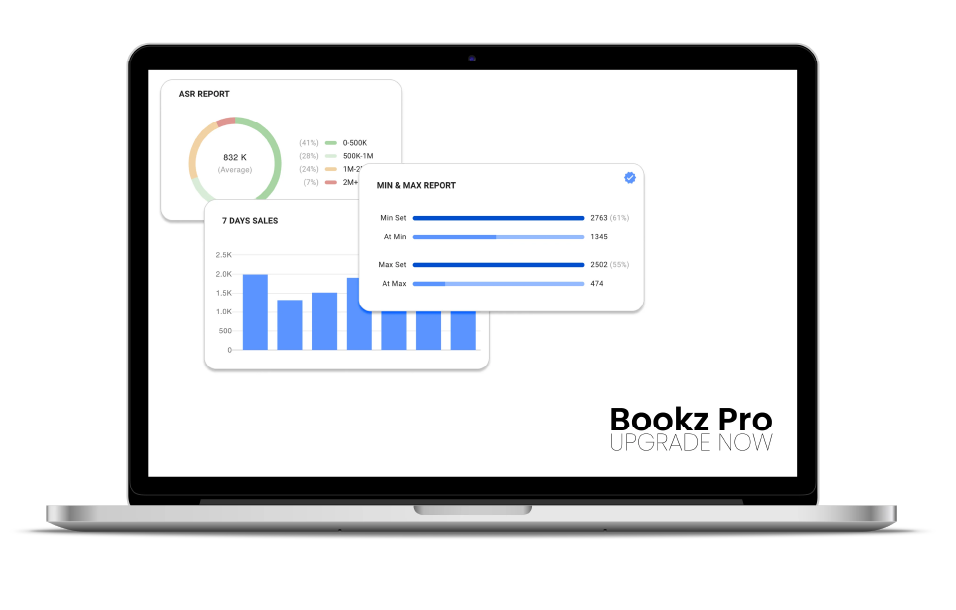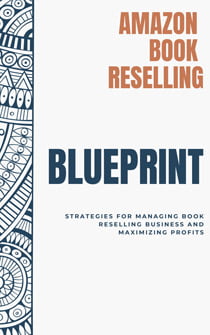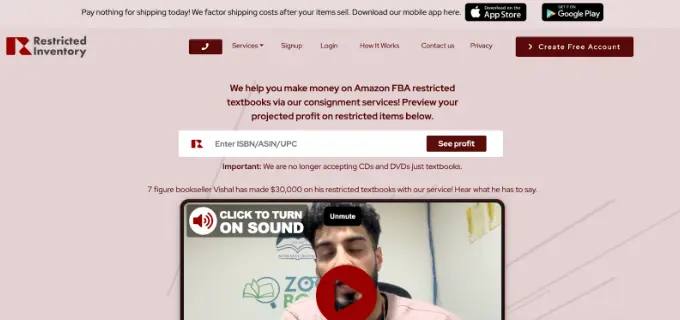Strategic Sourcing of Books for Amazon Booksellers

Selling books on Amazon is more than just listing titles; it’s about making smart, strategic decisions that drive your business forward. A solid sourcing strategy focused on finding the right books is the core of long-term success.
How do you find books that are both high-quality and profitable? This blog will share simple strategies to help you get ahead and run your business smarter.
The Basics of Sourcing
Most resellers start with thrift stores or online marketplaces because they’re easy to access and can offer valuable finds. But like any method, each comes with its pros and cons. Let’s take a look.
1. Thrift Stores
Thrift stores like Goodwill are popular among Amazon resellers. With their low prices, they often carry bestsellers, unique finds, and vintage books, making them attractive sourcing locations.
Pros:
- Budget-friendly: Thrifted books are often inexpensive, which means you can earn a good profit when you find the right ones.
- Unique finds: You might come across rare or out-of-print books that are hard to find elsewhere.
- Eco-friendly: Buying used books helps reduce waste and keeps them in circulation, which is great for the planet.
Cons:
- Time-consuming: Finding valuable books takes patience; you’ll need to dig through a lot to uncover gems.
- Inconsistent inventory: Inventory changes constantly, so it’s tough to rely on finding the same types of books.
- Quality control: You’ll need to inspect each book closely to avoid damaged or unsaleable copies.
2. Online Arbitrage
Online arbitrage means buying books at a lower price online and then reselling them on Amazon for a profit, taking advantage of price differences between platforms.
Pros:
- Save time and effort: Online sourcing lets you find inventory conveniently and on your schedule.
- Data-driven: With the help of tools, you can quickly spot profitable books using real-time data.
- Scalable: You can easily expand your sourcing by accessing multiple online retailers.
Cons:
- Price competition: Because many sellers chase the same deals, prices can drop.
- Market saturation: Popular products can quickly flood the marketplace, cutting profits.
- Shipping hassles: Relying on shipping adds complexity, with possible delays and extra costs.
While these methods are great for beginners, scaling your business requires blending traditional techniques with strategic sourcing to uncover high-quality, profitable inventory consistently.
3. Unique Sourcing Strategies to Try
Today, sellers thrive on Amazon by finding unique products. Many successful Amazon sellers thrive by sourcing rare or overlooked books that offer higher margins. While platforms like eBay and thrift stores can help, diversifying your sourcing, such as exploring consignment shops or local overstock, gives you access to untapped opportunities. Consignment shops can be a more innovative way to find hidden inventory. Many successful Amazon sellers have used such strategies to grow their businesses.
Try connecting with local stores to uncover unsold books, like overstock or older titles, that they no longer plan to sell. Some manufacturers also offer outdated or excess inventory directly to resellers at discounted prices.
Benefits:
- Diverse inventory: Many sellers have unique stock that your competitors might not even know about.
- Effective negotiation: Talking directly with store managers can help you score discounts, especially on bulk buys.
- Stronger relationships: Building good relationships can open the door to more sourcing opportunities.
Real-Life Example:
Sarah has been selling on Amazon for a while and has built a strong connection in her community. One day during her visit to her local hardware store, she connected with the manager and found out they had some extra stock sitting in the back, books they weren’t planning to put on the shelves. She was able to purchase these at a steep discount and bought the entire lot in one go. By reselling them on Amazon, Sarah turned a healthy profit and strengthened her local relationships, which helped her continue growing her business.
Consignment Services
Consignment sales allow you to sell products on behalf of others and earn a percentage of each sale, similar to working as an independent sales agent.
Pros:
- Reduced risk: Since sellers don’t need to buy inventory upfront, they reduce financial risk.
- Access to unique inventory: Consigned products can expand your inventory by introducing niche or higher-value books that traditional sourcing methods often overlook.
- Community engagement: Supporting local artisans and small businesses helps build strong connections between neighbors and strengthens the community.
Streamlining Sourcing and Inventory Management
As online sales continue to grow, managing inventory can quickly become challenging. That’s why it’s important to have tools that take the pressure off by saving time, reducing stress, and helping you stay organized. When routine tasks are automated, it’s easier to focus on growing your reselling business.
1. Improved Efficiency
Different tools and software can handle routine tasks like tracking stock and generating sales reports, so you can spend more time growing your business instead of being bogged down by repetitive, time-consuming tasks. By letting go of that admin burden, you can focus on moving your business forward.
2. Data-Driven Decisions
Inventory management tools make it easier to determine what to sell, when to sell it, and how much to ask for. They reduce uncertainty and increase profits.
3. Enhanced Scalability
As your business grows, managing inventory and sourcing can quickly become a lot to handle. Fortunately, technology makes it easier to manage more without needing extra help—a must-have in today’s fast-moving e-commerce world. That’s why building systems that can grow with you is key to keeping things running smoothly as you scale.
4. Better Customer Experience
A great customer experience starts with the basics: keeping the right books in stock, restocking when needed, and pricing things reasonably. When shoppers can count on you, they’re more likely to come back.
One tool that helps streamline sourcing and inventory management is Bookz Pro, an all-in-one solution designed to simplify product sourcing, inventory control, and real-time reporting. Bookz Pro enables resellers to streamline workflows and scale efficiently with actionable insights and minimal stress.
All in One Software
for Book Sellers
Scout Better – List Faster – Reprice Smarter
Over 30% Business Growth
Achieved by Our Clients

Building Connections in the Reselling Community
Networking, especially at meetups, is essential because it connects you with other sellers who offer new opportunities, valuable insights, and potential collaborations.
1. Knowledge Sharing
Sharing tips and strategies with other sellers helps you improve your sourcing and avoid common mistakes. Connecting with them lets you learn from their experience and gain valuable insights.
2. Collaboration Opportunities
Learning from other sellers’ experiences can spark new ideas and approaches, leading to collaborations that benefit everyone involved.
3. Emotional Support
When you’re on your own, reselling can be challenging. Connecting with others in the same space helps you stay motivated, share your wins and losses, and feel part of a community. A strong network can make a big difference as your business grows.
Tips for Attending Meetups and Engaging with Other Sellers
1. Prepare Yourself
Before you go to a meetup, research its focus and the participants who will be there so that you can come prepared with relevant questions or challenges.
2. Be Yourself
Openly share your wins and your struggles. Being honest like this helps you build real connections with others.
3. Follow Up
Stay in touch with people you meet by connecting on Facebook, email, or by planning to meet again.
4. Speak Up and Get Involved
Avoid staying on the sidelines; engage actively in the conversation by asking questions, sharing what’s worked for you (or what hasn’t), and jumping in when the moment feels right. That’s usually when the best ideas get shared, and it helps people actually remember you.
5. Stay Connected Online
Can’t always make it to meetups? No problem. There are plenty of groups, forums, and online chats where resellers hang out. It’s a convenient way to stay informed and continuously learn from others.
Unlock Your E-Commerce Potential with Bookz Pro!

Amazon Book Reselling Blueprint
Read now, explore our full guide. Your revolution starts here. Subscribe to get the blueprint!
Ready to truly master your bookselling business? Bookz Pro isn’t just software; it’s your strategic partner, offering the precision and power to optimize every sale, manage inventory like a seasoned pro, and significantly boost your bottom line. For booksellers, this means making data-driven decisions that cut wasted time, increase profits, and secure a competitive edge in the marketplace. Stop leaving money on the table and start maximizing your e-commerce potential today – discover what Bookz Pro can do for you!
Sign up for the Amazon Book Reselling Blueprint and discover step-by-step guidance to accelerate your business growth.
Conclusion
Strategic sourcing is the backbone of any successful Amazon bookselling business. Whether you’re sourcing hidden gems from thrift stores, leveraging online arbitrage tools, striking local deals, or using consignment strategies, the key is consistently finding high-quality inventory at the right price. Combine these sourcing strategies with practical tools like Bookz Pro to manage inventory and make data-driven decisions. Then, tap into the support of the reselling community to stay competitive and scale efficiently.
Frequently Asked Questions
You can find bulk books online through marketplaces like eBay or Amazon, or from wholesalers such as Bulk Bookstore. Estate sales, thrift stores, library sales, and local shops often offer great bargains on bulk books.
Look for reliable sources, like wholesalers and online retailers. For the best deals, browse book sales and bulk sellers. Consider sourcing from closed or auctioned bookstores.
BookPal and ThriftBooks offer low-priced bulk deals. Wholesalers like Book Depot and eBay also offer bulk book sales.
Yes, purchasing books in bulk is a legitimate and widely used method by Amazon sellers to build inventory efficiently. However, always vet suppliers through reviews and small test orders first.




